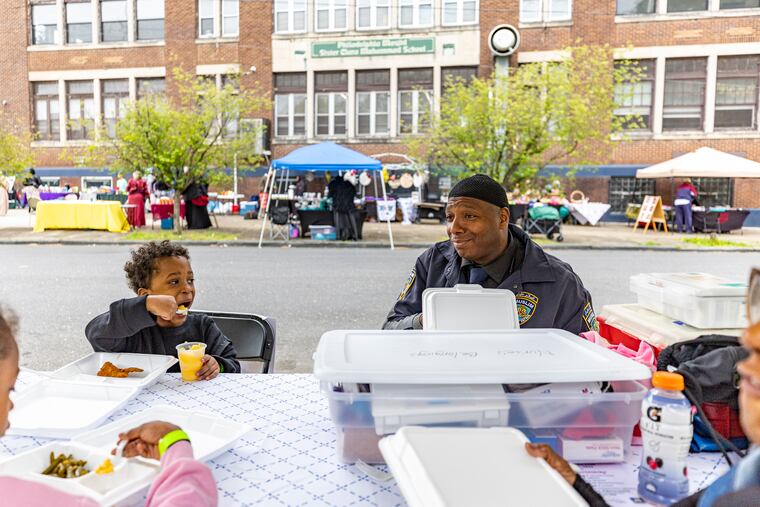Weeks after Ramadan shooting, site is reclaimed by food trucks, kid races, and pony rides
Just weeks ago, Clara Muhammad Square was the site of a shooting. Last weekend, the community gathered again in that same space to heal and rebuild.

On Saturday morning, I told my husband I was heading to the park. Be careful, he told me.
His concern wasn’t totally ungrounded. I was heading to Clara Muhammad Square in the 4700 block of Lancaster Avenue in West Philadelphia, the site of a shooting that took place only weeks ago. At what was meant to be a joyous occasion — an afternoon celebration of the end of the Ramadan fast — at least 30 shots rang out in a crowd of hundreds of people, leaving three injured.
Police arrested one adult and four juveniles; all will be charged as adults.
The incident has shaken Philadelphia’s Muslim community — a population of roughly 300,000 — and created psychic scars that will take a long time to heal.
Last Saturday was meant to help the community start that long walk to recovery. The Philadelphia Masjid, across from Clara Muhammad Square, hosted a community day replete with food, vendors, and counseling services.
To anyone driving past, the event might look like any of the community gatherings that make Philly such a great place in the summer. But I was taken aback by all the yellow police tape circling Clara Muhammad Square. It reminded me of that awful day.
As I approached the area, someone walked over and asked me to open my bag so he could inspect it for a weapon. Members of the Philadelphia Police Department stood guard around the park and masjid.
Once inside the cordoned off area, I steered clear of the black-clad security personnel carrying automatic rifles and wearing body armor roaming the grounds. Inside the mosque itself, there was even more heavy security, with male members stationed at the door and others gathered in a room off to the side watching multiple security camera screens.
Yet even with all of the law enforcement on display, it was a happy affair.
I watched elementary school children participate in an old-fashioned potato sack race. There were pony and horseback rides. Vendors set up on sidewalks sold jewelry, crocheted hats, henna tattoo services, and homemade cheesecake. People lined up at the Fish Jawn and Siddiq’s Water Ice food trucks. Politicians shook hands.
At one point, when I was walking around the masjid, I wandered into a room set aside for healing. Female participants gathered their chairs in a circle and talked about their pain — not just from the awful day of the shooting, but from previous traumas, as well. When it was my turn to introduce myself, I shared how I had felt drawn to be there with them. I noticed a few smiles and nods.
Before long, a call to prayer sounded over the loud speaker and silence fell over the room. When it was finished, the group leader resumed right where we’d left off, processing all that had happened on April 10 so people could move forward.
That’s really what the community day event was all about: reclaiming the park and masjid as a “safe” space. “When you came here, it was safe grounds,” Farida Boyer, the event’s organizer, told me. “This is not a space where incidents like that happened.”
I was happy to see how much members took that mission to heart. It wasn’t always easy. It was chilly out. The incident was still fresh in people’s minds. While I was in the group session, I listened as a participant described how her 9-year-old had been so traumatized by the shooting that he refuses to return to Clara Muhammad Square, and says he never wants to go to another Eid al-Fitr gathering again.
That’s unfortunate, because returning to the scene of a traumatic experience can be healing, Zakia Williams, a cofounder of the Philadelphia nonprofit Black Men Heal, told me.
“A lot of people think that if they avoid the thing that reminds them of the trauma that they experienced, it’s helping but it’s just reinforcing the fear,” explained Williams. “By facing what has been avoided, you can decrease the symptoms of the PTSD just by learning that [the traumatic event] was something that happened that one day,” and is now over.
She praised the masjid for hosting the community event, pointing out members had “stood strong, letting the community know that ‘we are here for you as Muslims, as Christians, as people from West Philly and that we’re going to take back the narrative that this is an unsafe place to be.’”
I stayed longer than I had planned. I left feeling reassured that the community was doing the right thing by reminding themselves — and everyone else — that one awful event didn’t define it. Because of that, it will remain a place of refuge where people can find still comfort and love.